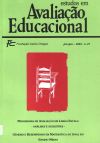Novos rumos para o processo de avaliar: desafios para os professores do ensino fundamental
DOI:
https://doi.org/10.18222/eae02720032181Keywords:
Avaliação, Aprendizagem, Autonomia, Parâmetros Curriculares NacionaisAbstract
Este artigo relata o breve estudo que teve como objetivos, inicialmente, analisar as relações entre avaliação e aprendizagem dos conteúdos sistemáticos propostos pela escola, identificando como a forma de avaliar e/ou os procedimentos de avaliação podem influenciar no processo de desenvolvimento e aprendizagem dos alunos avaliados. Posteriormente buscou-se analisar as modalidades de avaliação implementadas no Ensino Fundamental no contexto dos Parâmetros Curriculares Nacionais - PCNs, explicitando a sua contribuição para o desenvolvimento da autonomia do sujeito. A investigação foi realizada em quatro escolas públicas do município do Rio de Janeiro e teve como principais conclusões que há um empenho indiscutível da direção para o êxito das atividades que são desenvolvidas com seriedade e respeito pela equipe de professores e embora se observe, em diferentes momentos, os entraves para a realização das propostas oficiais, já se pode reconhecer que novos rumos para o processo de avaliar se instituem progressivamente.Downloads
Downloads
Published
How to Cite
Issue
Section
License
Authors who publish in this journal agree to the following terms:
a. Authors retain the copyright and grant the journal the right to first publication, with the paper simultaneously licensed under the Creative Commons Attribution License (CC BY 4.0) license that allows the sharing of the paper with acknowledgment of authorship and initial publication in this journal.
b. Authors are authorized to assume additional contracts separately, for non-exclusive distribution of the version of the paper published in this journal (for example publishing in institutional repository or as a book chapter), with acknowledgment of authorship and initial publication in this journal.
c. Authors are allowed and encouraged to publish and distribute their paper on-line (for example in institutional repositories or on their personal page) at any moment before or during the editorial process, as this can generate productive changes, as well as increase the impact and citation of the published paper (See The Effect of Open Access).







